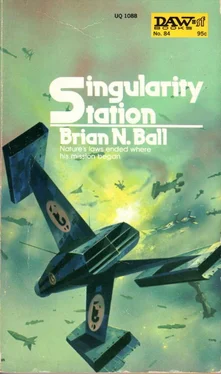“Let me pass,” he ordered.
“Commander Buchanan will remain in the hold until summoned by Commander Maran,” it informed him. Buchanan shrugged. “Get a couch for Miss Deffant.”
“Yes, sir.”
Liz was talking now. Some of the story came out, garbled and incoherent: “…he was so young! And those hands… but he had to do it! It was the animal that took over…. Al, he wasn’t responsible—but the eyes! The eyes in the cell-deck—all staring! It was green, Al—they were thrashing about and dying! But he had to do it that way! It’s the small-minded bigots who had him sent out! If he’s given a chance, he can change the nature of our minds! And poor Tup’s neck—it broke, broke!”
Al stopped the flow of words as her voice rose to an hysterical pitch. He could only guess at the horrors of the doomed ship’s last hours. Murder. The successive shocks of the cruisers’ combined fields. The escape of the wounded prison-ship commander. She should not go through the trauma of telling it, not yet.
He soothed her, comforting her by his physical presence.
“Rosario?” she asked abruptly.
“He was picked up. I had a message from the commander of the cruiser. He’s safe and well.” And then she was back in the nightmare. “I tried, Al—I found a gun—a musket, and I’ve never killed anything in my life—but I tried to kill him!”
“All right! Now rest! Tell me later!”
“But I tried to kill him!” She was trying to make him understand with an agony of desperation.
“Liz, I would have done the same!”
“But him!”
And Buchanan knew she was in a frenzied torment.
“Forget him! Rest now—sleep!”
“The musket fired—he knew!”
Buchanan began to worry. This was more than fatigue—more than understandable nervous reaction to even mayhem. Liz was in a state of acute anxiety over Maran.
“Not now, Liz,” he said. “Leave it!”
“I tried—to—kill—Maran.”
Buchanan thought of what he knew of Maran. A powerful and hypnotic personality, a man with a unique charisma, a man who could exert such a power over the minds of men and women that they volunteered willingly for the brutal surgery his machines inflicted on the deepest centers of the cortex. They died believing they were Maran’s disciples.
Liz?
She was staring at him with a shocked despair.
She had tried to kill Maran. And, because of that attempt, she was suffering from an unholy feeling of guilt that would not give her the slightest remission.
Buchanan sensed the right thing to say. Hating himself, but able to say the words to the woman he loved, he whispered: “He forgave you. Liz, Maran forgave you.”
Liz’s anguish diminished. Gradually the panic left her eyes. “Yes,” she whispered back. “He did.” She slept.
Buchanan kicked out savagely at the watchful servitor. Even as his legs braced to take the impact of its metallic bulk, a tentacle swept out to hold him. Another prevented him from falling. He sat down to watch Liz sleep. He had found her again, only to lose her to the mesmeric genius who had taken his ship.
The three of them were trapped, he and Liz doubly trapped. And where was the way out for any of them?
Watching Liz Deffant slowly emerge from a deep sleep, Buchanan had the curious impression that none of the events leading up to Maran’s presence aboard the station had happened. Time telescoped. They were together, and they seemed not to have separated. Liz looked tired, of course; they were in the cramped hold of the station; a servitor followed their every slightest movement; but they were the same people, he and Liz. They had a planned future.
Buchanan frowned. Except that Liz seemed to be under Maran’s spell. It was a matter he would have to approach with care. Maran himself was a different thing entirely; if only there was some weapon he could use against him! But it was out of the question. The responses of the automatons were measured in ten-thousandths of a second; Maran was right to rely on their lightning reactions. Then Liz opened her eyes and Buchanan could relax for a moment.
The panic and despair were gone.
Buchanan had always appreciated her levelheaded, gentle, persistent way of thinking. He respected her intellect. He had known her achieve better results than cleverer colleagues because she did not try too hard. She allowed her mind to range over a problem, letting an answer emerge by a slow process of growth. Buchanan could see that she had recovered her balance. However, he would not broach the question of her feelings about Maran.
“Liz, Fd like to know more about what happened—I know some of it,” he said. “I’d like to know so that I can think of some way of getting us out of this mess.”
“Al, we can’t do anything.”
He hadn’t expected this calmness. “No?”
“No, Al. We have to leave decisions to Maran now.”
Complete resignation, thought Buchanan. It was bad. “I tried to establish control while you slept.”
“It’s no use, Al. I’ve thought a lot about it.” A memory swam through her mind. An almost perfect humanoid, hair receding, smiling, concerned, knowing all about her. The clerk at Bookings had known exactly what she wanted, who she was, where she had been. “It was all too easy,” she went on, and Buchanan again felt hollow at the degree of resignation in her voice. “He knew that the robots would obey him.”
“Maran?”
She went on: “He must have had only a minute or two in which to gain control of the cell-deck. It couldn’t have been longer. There would have been automatic alarms, and the cruisers would have easily caught up with the ship.”
“It shouldn’t have happened at all,” agreed Buchanan. “The prison-ships are triple-protected by fail-safes. He couldn’t have got to them.” He attempted lightness: “When we get out of this, we’ll live primitive. No machines. You do the cooking, I’ll cut the wood. If a machine comes near, I’ll get it to abort itself.” Liz smiled, and Buchanan almost groaned with relief.
“Maran must have prepared, Al. Don’t you see, it was all too easy for him! He must have had contingency plans. I don’t believe he could have taken over the machines in so short a space of time—he must have foreseen that he would be taken out to the Rim on an automatic ship. Al, the machines know everything! They’re all mutually compatible.” Buchanan saw now. Maran would have got to the Enforcement Service central memory-banks. There would have been some kind of delay-circuit.
“Yes. That’s how he did it.”
“And the hypno-sleep conditioning—with a mind like his he could evolve a mental and physical simulation of conditioning. Drugs—an alteration of his neural patterns—and an instruction to the high-grade robots to cut in when the ES 110 was deep into the gulfs.”
“And I let him take over my ship.”
Liz was still wondering at Maran’s genius. “I’ve worked with the Grade One machines. They’re sophisticated. I sometimes think they have their own emergent personalities. They frighten me. But Maran could get to them. He must have contingency plans for when he gets away from the Singularity.”
“He can’t!” Buchanan could not allow it to pass.
“You don’t know him,” she answered quietly. “He’s more than human.”
“There’s no way out for him. Not with cruisers patrolling the entire Quadrant. There’ll be a network of ships and beacons out there until the station can’t support itself within the Singularity. It can’t get free—there just isn’t the Phase capability. We’re trapped; he’s trapped, Liz.” He hesitated. “You wouldn’t want him free?”
Читать дальше












